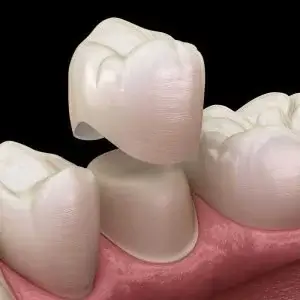A dental crown is basically a cap for a damaged tooth. It can be made from a variety of materials, including metal or porcelain

A dental crown is basically a cap for a damaged tooth. It can be made from a variety of materials, including metal or porcelain.
You might have a dental crown over a molar that rarely shows, except when you yawn widely, or you might have crowns on your front teeth that were specifically designed to match your other teeth.
Several factors are important to consider when choosing a dental crown, including:
A natural appearance that doesn’t detract from your smile may also be a priority for you. A dentist can discuss the various options and help you to figure out what best meets your needs.
Different kinds of materials can be used in crowns, including:
For example, you could have a porcelain crown that’s fused to metal instead of an all-porcelain crown.
When selecting the material for your dental crown, your dentist will consider factors such as:
You can also talk with your dentist about your personal preference. If you don’t already have a dentist, the Healthline FindCare tool can help you find one in your area if you are in need of a dental crown.
A temporary crown is exactly what it sounds like. It’s a dental crown that’ll only remain in your mouth for a short period of time.
Your dentist will place it over your tooth with an adhesive that’s easily removed so that it won’t be as strong as a permanent crown.
This is done while you’re waiting for a permanent crown to be made. The permanent crown will be placed on your tooth at a second appointment.
You can get a dental crown in a single appointment.
Some dental offices offer same-day crown installation using several methods involving computer-aided design/computer-aided manufacturing (CAD/CAM).
Your new crown is designed and milled from a block of ceramic right there in the office.
Some crowns only cover a portion of the tooth. If you don’t need a full crown, your dentist might suggest an onlay or 3/4 crown instead.
If you have a large cavity that’s too big for a filling, it may be time for a crown.
You may also need a dental crown if your tooth is:
Dental crowns are also recommended following a root canal treatment on a tooth because the tooth is more fragile and needs protection.
You may be a candidate for a crown if you’re missing a tooth, and the dentist needs to put in a dental bridge or a dental implant.
According to the Cleveland Clinic, crowns can range in price from $800 to $1,500 — or even more — depending on the material used in the crown and the size of the tooth.
A gold crown could set you back quite a bit more, perhaps as much as $2,500, according to CostHelper Health.
All-metal dental crowns, made of a metal alloy, are sometimes cheaper than gold or porcelain crowns.
Costs may also rise if the dentist performs more extensive prep work before putting in the crown. For example, you may need a root canal or a dental implant, both of which can drive the price up.
Dental insurance may cover all or part of the cost of your crown. However, your plan may only cover certain kinds of dental crowns. Check with your insurance company to get coverage details.
Talk with your dentist about the available and appropriate dental crowns for your dental needs to help determine your dental costs.
The process will depend on whether your dentist opts for a multi-day or same-day dental crown procedure.
With a traditional crown, you will need to visit your dentist’s office twice.
With a same-day dental crown procedure, you can skip the temporary crown step.
You might even be able to head back to work while you’re waiting, depending on your specific situation.
Not all dentists have the technology to make same-day dental crowns. Ask your dentist if this option is available and the estimated cost, especially if you don’t have dental insurance.
Once the crown is in, it’s important to take proper care of it. Careful attention to your crown can prolong its life.
Here are some helpful tips:
You’ll want to be especially gentle with a temporary crown because the adhesive is only meant for temporary installations.
Brush as usual but be extra gentle. When you floss, try to pull the floss out from the side of the tooth instead of snapping the floss back upward, which could dislodge the crown.
Call your dentist if your temporary crown comes off or breaks while you’re waiting for the permanent crown. Your dentist can reglue it or make a new one for you.
A crown can be a beneficial solution to a significant problem with one of your teeth. But there are risks and possible complications that you might experience after getting a crown:
It’s not unusual for a crowned tooth to be sensitive to heat or cold.
However, if your tooth is susceptible to pressure when you bite down, the fit may be off. Talk with your dentist about possibly changing the placement of the crown or filing down the top of the crown.
Certain types of dental crowns, notably all-porcelain crowns, are more vulnerable to chipping. Your dentist may be able to fix small chips.
The porcelain used for porcelain-fused-to-metal dental crowns may break away, revealing the metal structure underneath. These chips may not need to be repaired if the metal is still intact.
Your crown could get loose or even fall out if there’s not enough cement keeping it in place. Call your dentist if you think your crown feels loose or wiggly.
It’s not common, but some people can have an allergic reaction to the metal used in some dental crowns.
If you notice your gums around your crown getting sore or irritated, or if this area starts bleeding after dental crown procedure, you may be developing gingivitis or gum disease.
The lifespan of a dental crown can vary between 5 and 15 years. Some dental crowns are sturdier than others so that they may last longer.
For example, a 2016 study trusted Source subjected three different monolithic crowns to “high bite forces” and found that monolithic zirconia crowns were the least likely to split or crack.
A monolithic crown is a crown made from a solid piece of material, such as zirconia.
However, researchers used models for their experiments. They also warned that variations in crown placement and other factors could affect the results in an actual person.
As a general rule, gold crowns and porcelain-fused-to-metal crowns tend to last the longest.
All-ceramic and all-porcelain dental crowns may look more natural, but they’re usually not as strong as the metal or porcelain-fused-to-metal versions. All-resin crowns tend to wear down faster, too.
When taken proper care of, dental crowns can last many years.
Your dentist will most likely recommend the dental crown procedure that works best for your specific situation or is the best alternative option.
For example, your tooth may be too weakened or worn down to support a regular filling, so veneer is recommended if it’s a front tooth or another type of treatment.
Or, your tooth may have a cavity that’s too big for a filling, and your dentist recommends a crown as the best alternative dental treatment option to protect the tooth.
To read the original article, click here.
Note: All content and media on the Elevate Dental Richmond website and social media channels are created and published online for informational purposes only. It is not intended to be a substitute for professional medical advice and should not be relied on as health or personal advice.
Book your checkup & clean or a Free Smile Consultation at our Richmond clinic. Same-day appointments may be available.
Book Now
